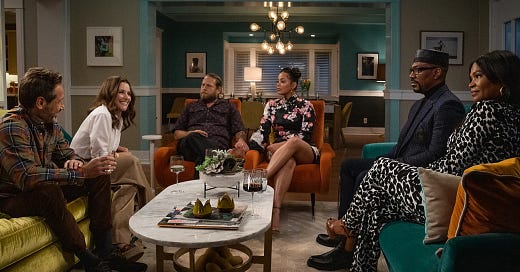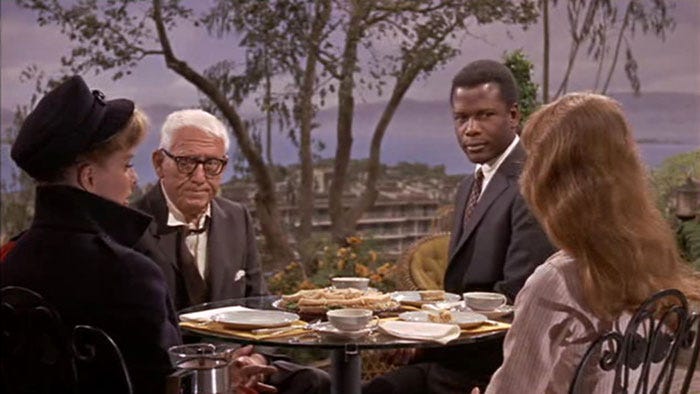An interracial couple falls deeply in love with each other. Before the two can really be happy and secure in their relationship, they must receive the blessing of their parents. It’s an age-old tale, first told by Stanley Kramer in 1967.
Guess Who’s Coming to Dinner tells the story of Joanna Drayton (played by Katharine Houghton) and Dr. John Prentice (the incomparable Sidney Poitier) returning to Joanna’s parents’ home back from vacation in Hawaii, where they first met and quickly became smitten by each other. The new couple’s 10-day trip turned into a whirlwind romance and hasty engagement. A spur-of-the-moment decision of this magnitude alone would be enough to drive any caring father mad. But when you factor in the year the film was produced and released, in the middle of a contentious Civil Rights Movement era and just months after the Supreme Court struck down laws banning marriages between individuals of different races in Loving v. Virginia, Joanna’s parents (Katherine Hepburn and Spencer Tracy), liberal as they may be, cannot possibly be expected to welcome John into their family. To make matters worse, Prentice’s parents (Beah Richards and Roy Glenn) shared the Drayton’s skepticism. In the end, the matriarchs of the families implore the fathers to remember what true romance feels like, and in turn, they accept John and Joanna’s union.
Hollywood has retold the foundation of Kramer’s story time and time again: it was adapted for television by Kramer himself in a failed pilot of ABC in 1975, and in Golden Girls and The Fresh Prince of Bel-Air; it was remade in 2005 in Guess Who, starring Bernie Mac, Ashton Kutcher, and Zoë Saldaña, which reverses the dynamic (Black woman and white man); and it has even been used as inspiration for alternative takes on the narrative, like in Jordan Peele’s classic Get Out. So it makes sense that Netflix went back to the well for their second American feature film release of the year.
You People, directed by Kenya Barris (Black-ish) and written by Jonah Hill (Superbad) and Barris, follows Ezra (Hill), a 35-year old Jewish man dissatisfied with his dearth of romantic prospects and his unfulfilling job as a broker, and Amira (Lauren London, ATL), a newly-single Black stylist who hasn’t yet caught her big break. To accompany them, Netflix brought out the who’s who of comedic actors. Eddie Murphy (Coming to America) and Nia Long (Love Jones) play Amira’s parents, Akbar and Fatima; Julia Louis-Dreyfus (Veep) and David Duchovny (Californication) play Ezra’s parents, Shelley and Arnold; and many others including, Deon Cole, Elliot Gould, Rhea Perlman, and Mike Epps round out the star-studded cast. For the most part, each one delivers. I also have to give an extra shoutout to Sam Jay, longtime writer on Saturday Night Live, who played Ezra’s best friend and podcast co-host, and Travis “Taco” Bennett from Odd Future fame, who played Amira’s brother, for their performances key to the aspects of the movie I liked.
As expected, Barris and Hill sprinkle in parallels to past adaptations all throughout the film. Akbar as an ardent follower of the Nation of Islam and Shelley as an aloof, wealthy white woman trying to be hip cover ground we’ve seen before. Akbar refuses to accept the new couple and Shelley tries way too hard to “relate” to Amira. Shelley’s introductory meeting with Amira plays similar to Bradley Whitford and Daniel Kaluuya’s first encounter – Louis-Dreyfus bemoans police brutality in a manner eerily close to Whitford’s, “I would have voted for Obama a third term if I could” in Get Out.
Where You People excels is in the separate cultural moments within the Black and Jewish communities. The opening scene of Ezra and family at a Yom Kippur service and Amira with her father and brother at a smoothie shop provided some of the biggest laughs of the movie’s almost two hour run time. Barris and Hill could’ve added much more of them. I also believed in the romantic chemistry between Ezra and Amira. When I watched the trailer for the first time, I doubted whether Hill and London could pull it off, but they did. London, still just a few years past from losing her husband (the movie pays tribute to the late great Nipsey Hussle by having one of his songs in its soundtrack and making reference to his Marathon clothing brand), brings to Amira everything I liked about her as New New in ATL: a dimpled smile that can light up a room and a “take no mess” posture that can ward off any out-of-line lover or adversary. Not many out there can play an LA millennial Black women better. And Hill gives Ezra a disarming timidity and sly humor that makes you both laugh with him and want him to stick up for himself. Together, the odd couple fits. Because of this, You People is sure to be a crowd-pleaser for audiences either in the theater for a limited run or when it begins streaming on Netflix.
When Guess Who’s Coming to Dinner came out in 1967, American society was being held together only by tape and glue. Just four months after the movie’s release, James Earl Ray assassinated Martin Luther King Jr. in Memphis, forcing a one-liner with King as the punchline to be removed from most of the film’s screenings. Similarly, Peele’s Get Out followed a slew of Black people killed at the hands of police, from Michael Brown to Freddie Gray. You People comes after what felt to me like a 10-year-long few months of discourse™ about anti-Semitism via Kyrie Irving and Kanye West. I couldn’t stand any of it; why anyone would look to Irving or West for their thoughts on race and anti-Semitism is beyond me (for so many reasons I don’t even want to say). It drummed up much of the animus between Black and Jewish people that, as writer and critic Soraya McDonald perfectly outlined, is antithetical to the solidarity both aggrieved groups have shared throughout history, and only serves to sow the seeds of discord white supremacist fascists salivate over. This movie will be sure to rekindle flames of this tired debate with think pieces, Twitter debates, and vomit-inducing Anti-Defamation League campaigns. I’m already annoyed!
[Sidenote: Check out Soraya’s wonderful Substack! ]
You People also falls susceptible to some of the “and the moral of the story is…” pitfalls Barris’ Black-ish and its various spinoffs are known for. Good storytellers often do a great job of showing the audience rather than telling them. They trust that the audience can understand complexity as long as they show their work. There were too many moments where I thought Barris and Hill felt like they needed to hold our hand to get us where they wanted us to go.
These two gripes aside, You People is an amusing movie for the same reason Guess Who’s Coming to Dinner was a little over 56 years ago. It depicts a real dilemma, facing the world as an interracial couple, which even in 2023 must be difficult. In and of itself, interracial dating is no longer the radical statement some make it out to be every passing anniversary of the Loving v. Virginia decision; however, the combination of self-doubt, perceived (real or not) judgment from the outside world, and very real racism that plagues society at every level can’t make that type of relationship easy to navigate. But as Ezra and Amira try to show their families, as long as there’s a will to respect differences and truly understand the dark history of race and religion throughout human history, bonds that transcend both are possible.





